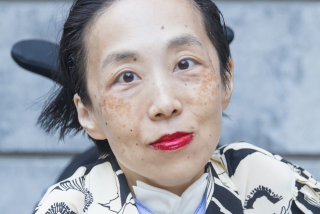Sex in the Shadow of Illness and Disability
- Share via
A smooth-sailing sex life can be difficult enough to attain when all body parts are in fine working order and one’s basic health is good. When that isn’t the case--when a woman is dealing with cancer, perhaps, or has a disability such as multiple sclerosis or a spinal-cord injury--problems in the bedroom are compounded.
Such women may have special emotional and practical concerns and may need special help from doctors and therapists.
Surveys of women who have had breast cancer, for instance, show that while many aspects of sex are just as satisfactory as for unafflicted women of similar age, there are particular areas of difficulty.
Women who have had breast surgery, for instance, may feel uncomfortable about their “disfigurement,” says Beth Meyerowitz, a USC psychologist who has done such research and specializes in sexual counseling for people with life-threatening cancers. They may not want to be seen naked or have their breast area touched.
Lingering pain at the surgery site is one reason why--but not the only reason.
“It may be they feel unattractive in that area, or fear negative reactions from their partner,” Meyerowitz says. “For others, it may be a reminder, at a very intimate moment, of having had a life-threatening disease. Those thoughts are not very sexy.”
There are ways to get over this “touching” issue--special desensitizing exercises in which women repeatedly touch their breast area until it’s less emotionally charged to do so. Later, a woman can involve her partner in similar activities in the bedroom.
If women have had chemotherapy, there are other sexual issues. Drugs that fight cancer attack the ovaries as well and may induce premature, permanent menopause in women who are in midlife. (Menstrual cycles tend to return in women who are younger.) This causes estrogen levels to plummet, causing vaginal dryness. Lubricants can help.
And women with cervical cancer whose treatment includes radiation therapy of the pelvic area may experience a shortening and a closing-in of the vaginal canal. Special exercises can help maintain the vaginal opening.
“I think it’s very important that physicians, nurses, counselors and social workers--all people working with people recovering from cancer know the sexual side effects and changes in sexual function that people experience,” Meyerowitz says. “We know from patients that they’re unlikely to bring it up themselves--they’re embarrassed, or feel the doctor is not interested. It really is incumbent on the doctors to raise it themselves.”
Women with physical disabilities--such as arthritis, multiple sclerosis, lingering effects of a stroke, and spinal-cord injuries--have unique challenges too, says Margaret Nosek, director of the Center for Research on Women With Disabilities at Baylor College of Medicine in Houston.
Some of the issues are ones of movement--a woman with arthritis may find certain sexual positions and limb movements painful, for instance. Other issues have to do with side effects of medication, such as vaginal dryness, or with immobility and loss of sensation in the genital area.
“When you become paralyzed, you have to relearn everything--including sex,” says Kimberly Black, an Austin, Texas, resident who injured her spine in her teens and has researched disabled women’s sexual issues. (She now counsels women with disabilities on sexual issues, among other things.) “A lot of the time women won’t have sensation any more. They won’t know if they can have an orgasm or not.”
Oftentimes, research shows, paralyzed women can have orgasms.
“But it takes work and practice--a whole relearning,” Black says. “If they can’t but still have sensation in the breast, they can get stimulation that way.”
Creativity--and a helpful, willing partner, are key to sexual success.
“Your partner has to help you a lot more--to get undressed, into different positions, find ways to arouse you wherever you do have sensation,” Black says.
These days, women who suffer injuries are likely to get counseling about sex during rehabilitation, Black says. There are more books, videos and articles available than there were when she had her accident 17 years ago.
But in a study coauthored by Nosek contrasting 500 disabled women with 500 able-bodied women, those with disabilities were less satisfied with their sex lives, and reported they did not get enough touching in their lives.
In another study, some women with disabilities said they were less likely to get thorough pelvic exams and advice on sexual matters when they visited the doctor.
It’s important, Nosek says, that women’s primary care physicians forge links with disability specialists so they can learn more about the day-to-day issues--including sexual ones--a given disability raises in women’s lives. Her center offers medical education to doctors on such matters--and often, she says, it’s the first they’ve heard of a lot of these topics.
Perhaps most important, she says, society has to wake up and realize that disabled women like Nosek (who has a neuromuscular disorder and uses a wheelchair) are interested in having a happy, healthy love life.
“We’re women first and foremost,” she says.
*
For more information on disabilities and sexuality, contact the National Spinal Cord Injury Assn., (800) 526-3456, or visit the Web site for Baylor College of Medicine’s Center for Research on Women with Disabilities, https://www.bcm.tmc.edu/crowd/. For information on cancer and sexuality, contact the Cancer Information Service at (800) 4CANCER or https://cis.nci.nih.gov/; National Alliance of Breast Cancer Organizations at (888) 80-NABCO or https://www.nabco.org; or the Susan G. Komen Breast Cancer Foundation at (800)IMAWARE or https:// www.komen.org.






